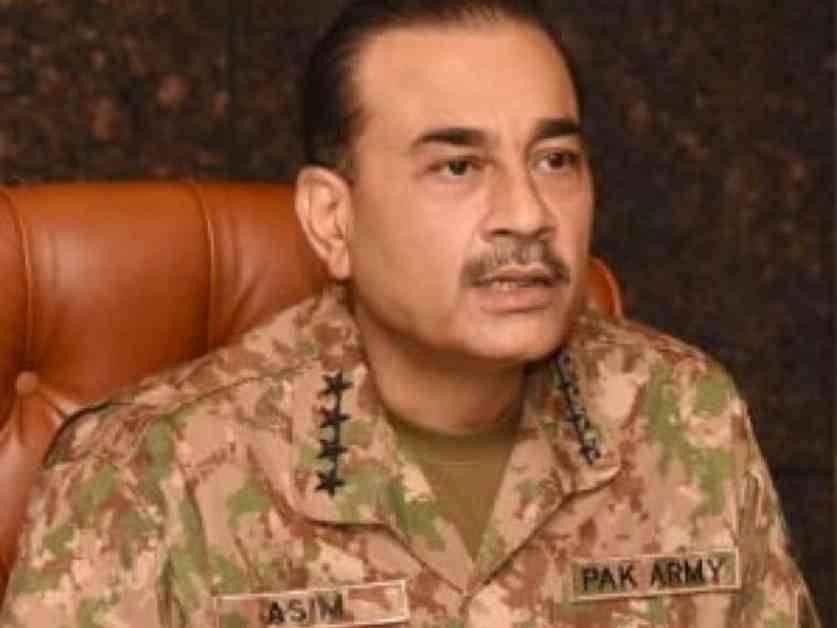Pakistan’s Chief of Army Staff, General Asim Munir, recently made headlines by denying claims of receiving a letter from anyone, emphasizing that if such a letter were to surface, he would promptly forward it to Prime Minister Shehbaz Sharif. This statement was made informally during a luncheon hosted for Turkish President Recep Tayyip Erdogan at the Prime Minister’s House. General Munir asserted, “I have not received any letter from anyone, and even if I do, I will not read it. I will send it to the Prime Minister.” This public declaration sheds light on the dynamic political landscape of Pakistan, with implications that extend far beyond mere correspondence.
The significance of this statement lies in the backdrop of recent events where PTI lawyer Faisal Chaudhry claimed outside Adiala Jail that Imran Khan, former Prime Minister of Pakistan, had dispatched a third letter to the army chief. Allegations of electoral fraud and concerns regarding governance were at the core of this correspondence. Chaudhry disclosed that the contents of the letter encompassed six key points, addressing critical issues such as the necessity for structural reforms and the impact of governmental policies on democracy. These revelations hint at a deep-seated dissatisfaction within the political sphere, echoing the sentiments of a populace yearning for change and accountability.
Imran Khan’s correspondence with General Munir serves as a poignant reminder of the fragility of the democracy-security paradigm in Pakistan. The act of resorting to open letters as a means of communication underscores the complexities of power dynamics and the struggle for influence in a nation grappling with multifaceted challenges. Khan’s public expression of disappointment in his initial letter’s reception reflects a broader sentiment of disillusionment with the status quo. As the political landscape continues to evolve, the interplay between key stakeholders like the military, the government, and opposition parties becomes increasingly intricate.
Implications of Military Involvement
The intertwining of military and civilian affairs has long been a subject of contention in Pakistan’s political narrative. General Munir’s assertion of redirecting any received letters to the Prime Minister underscores the military’s commitment to upholding democratic norms and constitutional processes. However, the mere existence of such correspondences raises questions about the extent of military involvement in governance and decision-making. This delicate balance between security imperatives and civilian oversight remains a focal point of debate and speculation among analysts and policymakers alike.
The army chief’s statement also alludes to broader themes of national progress and stability. By emphasizing Pakistan’s developmental trajectory, General Munir seeks to reassure the public of the military’s dedication to the country’s well-being. This narrative of patriotism and service resonates with a populace eager for stability and prosperity in the face of internal and external challenges. As the nation navigates through turbulent waters, the role of key institutions like the military in shaping its future trajectory cannot be overstated.
Political Ramifications and Public Perception
The unfolding saga of letters and public statements between Imran Khan, General Munir, and other political figures carries significant implications for Pakistan’s political landscape. The allegations of electoral malpractice and governance issues underscore the deep-seated grievances within the opposition ranks. As parties jostle for power and influence, the public specter of corruption and mismanagement looms large, shaping voter sentiment and political dynamics. The decision to appoint new members to political committees and negotiation teams signals a strategic realignment within opposition circles, hinting at potential shifts in policy and approach.
Imran Khan’s decision to escalate his concerns through open letters reflects a broader trend of public engagement and accountability in Pakistan’s political discourse. The use of social media platforms to disseminate such messages underscores the evolving nature of political communication and citizen engagement. As the nation grapples with issues of governance, transparency, and representation, the role of public figures in articulating concerns and advocating for change becomes increasingly paramount. In the midst of evolving narratives and power struggles, the voice of the people remains a potent force driving political transformation and reform.
In conclusion, the recent developments surrounding Imran Khan’s letters to General Munir and the ensuing responses underscore the complex interplay of power, politics, and public sentiment in Pakistan. As key stakeholders navigate through a landscape marked by uncertainty and contention, the need for dialogue, transparency, and accountability becomes ever more pressing. The exchange of letters serves as a microcosm of broader systemic challenges and aspirations, reflecting a nation at a crossroads, seeking to define its path forward amidst competing interests and visions. As the political drama unfolds, the echoes of these exchanges reverberate through the corridors of power, shaping the destiny of a nation in flux.









